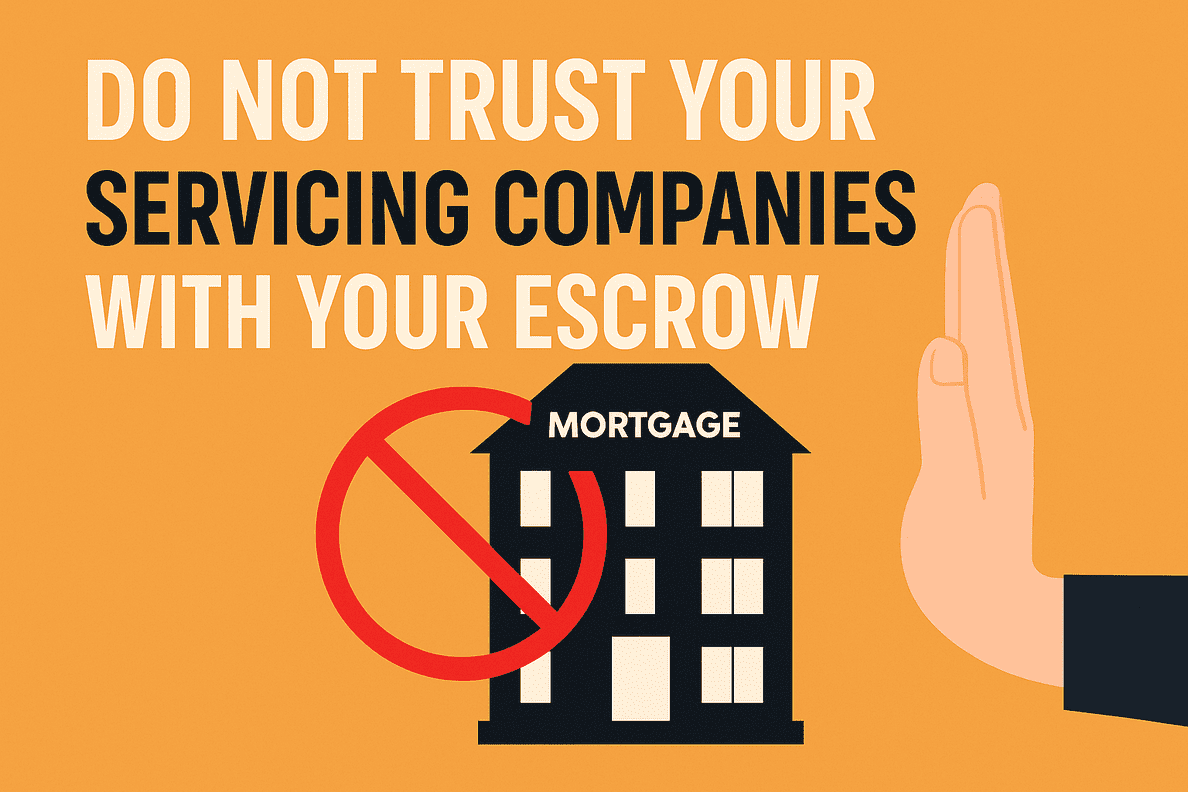
Listen while driving!
Do Not Trust Your Servicing Companies With Your Escrow
Let me save you a $600-a-month headache—because yes, that’s what my mortgage servicing company tried to sneak onto my bill. And no, I didn’t let them get away with it.
Here’s What Happened
One day I get a notice: “Your escrow has been adjusted.”
Translation?
We just threw some random insurance on your property and jacked up your payment. Have a nice day!
They claimed I didn’t have valid insurance on file, so they slapped on forced-place insurance. And let me tell you—this stuff isn’t cheap. It’s like buying a Bugatti when all you need is a Toyota Corolla.
The funny part?
I already had insurance. They just didn’t process the paperwork.
The Call That Changed Everything
I called them and said,
“Hey, I’ve got coverage. Here’s the proof.”
But then the rep hits me with:
“Your policy needs to match the market value of the home.”
Now, I’ve been in the game 20+ years. So I told them straight up:
“You’re the lender. You don’t care about the granite countertops. You care about your loan. And my coverage matches that.”
They pushed back.
I stood my ground.
Then I sent in the policy as-is.
Guess what happened?
A few weeks later:
✅ Insurance accepted
✅ Forced policy removed
✅ $600 monthly savings
What Is Escrow, Really?
Let’s break this down. When you pay your mortgage, you’re actually paying for a bundle of things: principal, interest, taxes, and insurance. The taxes and insurance get tucked into something called an escrow account.
Your mortgage company collects those extra payments and is supposed to use them to pay your insurance company and your county tax collector. Think of it like a middle school kid who collects lunch money from classmates and promises to hand it to the cafeteria lady. Except sometimes? They spend it on snacks instead.
Common Escrow Mistakes Mortgage Servicers Make
Mortgage servicers are the middlemen. They’re not the ones who gave you the loan—they just manage it. And that means mistakes happen. All. The. Time.
Here are some common screwups:
-
Double-paying insurance
-
Not paying insurance at all
-
Paying the wrong policy
-
Using outdated tax info
-
Charging for policies you didn’t ask for (forced-place)
-
Failing to notify you of changes
And the worst part? You usually don’t find out until your payment explodes.
Real Investor Scenarios
I know dozens of investors who got hit by these issues.
One buddy of mine had his escrow short $3,200 by year-end because his taxes went up and the servicer never updated their estimate. He only found out when his payment jumped by $267 overnight.
Another guy got charged for a policy that was canceled six months earlier. They claimed they “never received the cancellation notice.” You know what they did receive? His money.
And then there was a newer investor I coach. She had no clue what escrow even meant. She thought “escrow adjustment” was a good thing. It took three months before she figured out she was being overcharged almost $200 per month due to a duplicate insurance policy.
How to Audit Your Escrow Like a Pro
Here’s a checklist I give all my VIP coaching clients:
-
Request an escrow breakdown from your servicer at least once a year.
-
Compare the listed insurance policy with the one you actually have.
-
Cross-check the property taxes they show against your county website.
-
Look for forced-place insurance or anything labeled “hazard insurance.”
-
Call your actual insurance agent to verify payments are current.
-
Keep a paper trail: receipts, policy declarations, emails.
And if something looks off? Challenge it immediately.
How to Dispute an Escrow Error
-
Step 1: Call and document. Always get the name and ID number of the rep you speak to.
-
Step 2: Submit your insurance declaration page in writing (email or fax). Don’t rely on phone promises.
-
Step 3: Request removal of any forced-place policies and confirmation in writing.
-
Step 4: Follow up every 3-5 business days until resolved.
-
Step 5: Request a credit/refund if the error caused an overpayment.
If they drag their feet? You can escalate to your state’s insurance commissioner or file a complaint with the CFPB.
Why This Matters for Real Estate Investors
If you’re buying one home, maybe this isn’t a huge deal. But if you’re an investor with five, ten, or forty doors like me? One missed error can multiply fast.
Imagine $300 in errors per door, across 10 properties. That’s $3,000 in your cash flow… gone. Every single month.
And this is the kind of stuff that eats away at your long-term success without you even realizing it. Death by 1,000 paper cuts.
What You Can Do Differently
-
Don’t set your mortgage on autopilot forever. Treat it like a business expense that needs periodic review.
-
Get a solid insurance agent who knows investor policies.
-
Ask your CPA or bookkeeper to review mortgage statements quarterly.
-
Educate your property manager about red flags.
-
Most importantly: Trust, but verify.
Final Thought
I’m not saying all servicing companies are shady. But I am saying this: their systems are built for automation, not accuracy. That means you need to be the human in the loop.
So the next time you see the word “escrow adjustment” on your mortgage statement, don’t ignore it. Call, check, challenge, and correct.
Because every dollar counts—and that $600 I fought for? It’s now covering part of my next rehab project.
Keep it consistent, stay patient, stay true—if I did it, so can you!
Want help reviewing your deals or escrow?
Contact me at http://graystoneig.com/ceo – Jorge Vazquez, CEO of Graystone Investment Group & Coach at Property Profit Academy.
Pick your expert. Book your free 15-minute consult now. We are here to help!
Our Top Articles
Why You Should Sell Your Deals with Us
Jorge Vazquez2025-08-02T03:43:24+00:00August 2nd, 2025|Comments Off on Why You Should Sell Your Deals with Us
Let’s keep it real—wholesaling ain’t easy. You lock up a deal, hustle to find a [...]
Landlords, Listen Up: Florida’s A+ Economy Is Coming—Here’s Why 2025 Still Makes Sense
Jorge Vazquez2025-08-01T19:53:23+00:00July 31st, 2025|Comments Off on Landlords, Listen Up: Florida’s A+ Economy Is Coming—Here’s Why 2025 Still Makes Sense
Florida’s A+ Economy in 2026: What This Means for Landlords, Renters, and Real Investors Like Me By Jorge Vazquez, [...]
What It Really Takes for Agents to Make Millions in Real Estate
Jorge Vazquez2025-08-01T01:32:51+00:00July 31st, 2025|Comments Off on What It Really Takes for Agents to Make Millions in Real Estate
What It Really Takes for Agents to Make Millions in Real Estate Inspired by a Fellow Featured Agent—Kat Palmiotti [...]
Property Profit Academy:
✔ Learn to buy properties with little to no money down.
✔ Build a $10M portfolio step by step.
✔ Master strategies like BRRRR and house hacking.








